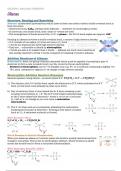Samenvatting
Summary notes for AQA A-Level Chemistry Unit 3.3.4 - Alkenes
- Vak
- Instelling
- Boek
Summary notes for AQA A-Level Chemistry Unit 3.3.4 - Alkenes by an Imperial College London MSci Chemistry graduate. Notes divided into the following sections: Structure, Bonding and Reactivity, Addition Reactions of Alkenes, Addition Polymers
[Meer zien]





